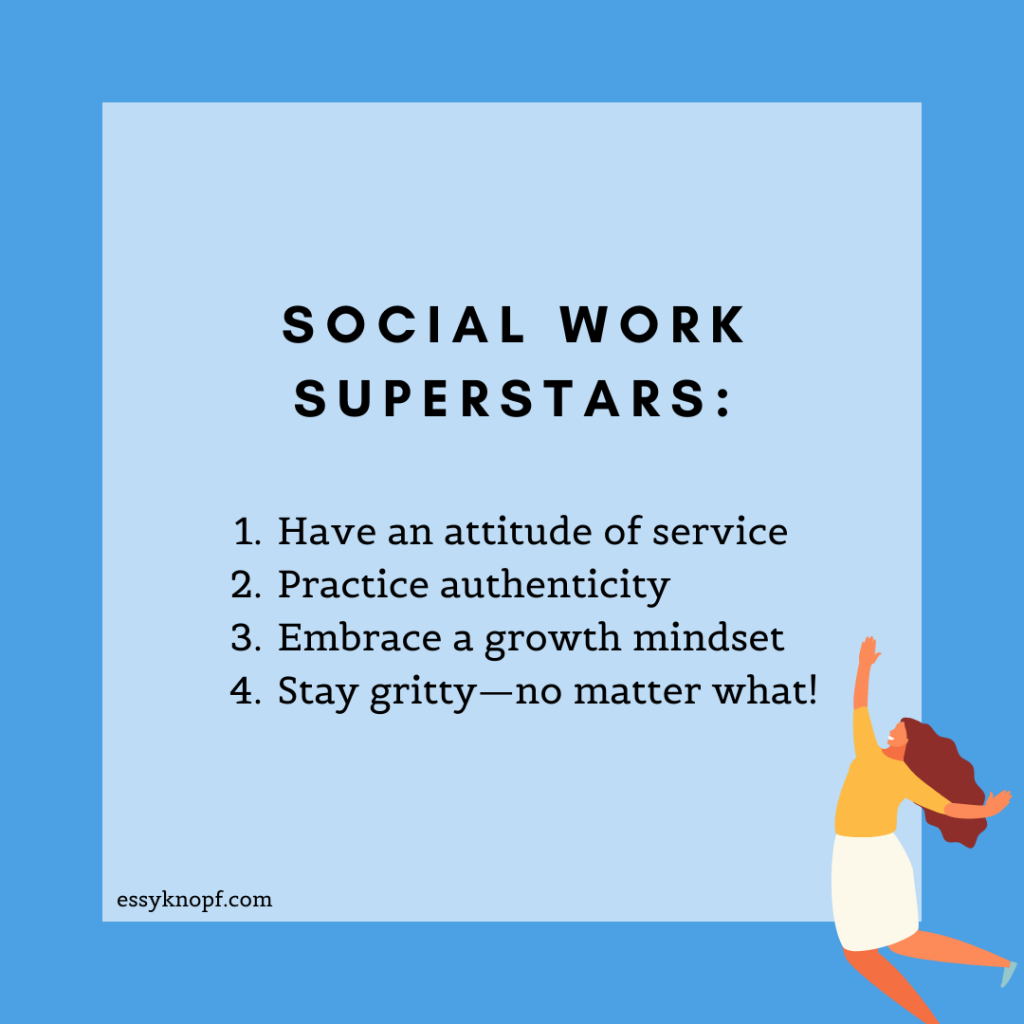Survive the social work career marathon with these 4 secret qualities
The Master of Social Work (MSW) is a terminal degree. Terminal, as in “final”, not fatal (although some students caught up in the struggle to complete an MSW program may argue otherwise!)
For most social work practitioners, no further education is required. As a generalist degree, the goal of the MSW program is to equip students with the knowledge and skills required to undertake a variety of roles.
At the same time, this generalist focus may run counter to the goals of those students who aspire to specialization.
Whether your aim is to become a clinician trained in DBT, to run support groups for homeless youth, or to advocate for renter rights, you may emerge from graduate school feeling ill-prepared for the rigors of your profession.
Being a jack-of-all-trades may even leave us with the gnawing insecurity that we are also masters of none…what’s also known as “social work student imposter syndrome”.
Regardless of your chosen path, know that your success does not depend so much upon access to specialist knowledge and training as it does certain qualities.
Here are four I believe are key to becoming a social work superstar.
Table of contents
1. A social work superstar has an attitude of service
It’s fair to assume that most of us were drawn to the social work profession by the desire to serve others.
But a desire to serve and an attitude of service are not the same. A desire implies an intention, whereas an attitude implies a mindset.
A social worker with an attitude of service does not reserve “unconditional positive regard” for clients only. Rather, they see it as their mission to find, accentuate, and celebrate the best in everyone.
A social worker with an attitude of service contributes to the flourishing of all. They are gracious, empathetic, and collaborative.
They abide, in short, not by the ego, but by humility. Practicing an attitude of service means being guided as much by a professional code of conduct as by a higher ideal.
2. They practice authenticity
Social workers are real people with their own thoughts and feelings, and authenticity asks a social work superstar to be congruent in their expression of those feelings and thoughts.
One way we can be authentic is through self-disclosure. Hartley et al. (2001) offer these two simple templates for self-disclosing about our own learning experiences:
- “When I (past life experience), I felt (past feelings elicited). I wonder how that fits for you.”
- “When I did (past behavior), I experienced (effect of past behavior). I wonder how that fits for you.”
It is essential of course that such statements not be self-serving. The goal is to share comparable or relatable experiences as a means of building rapport.
Being authentic refers not only to staying open, honest, and genuine. It’s also a powerful philosophy that can also enrich our daily life.
Brené Brown defines authenticity as choosing to cultivate “the courage to be imperfect—and vulnerable. We have to believe that we are fundamentally worthy of love and acceptance, just as we are.”
Rather than concealing our authentic selves behind a sterile mask of professionalism, we can choose to emerge as our imperfect, genuine selves in the knowledge that this creates conditions for others to do so as well.

3. They adopt a growth mindset
Do you believe all your qualities are set in stone? Do you measure your success and self-worth based on the outcome of every situation you face in life?
Are you constantly striving to prove yourself over and over? Do you fear losing positive labels, or believe you may deserve negative ones? Do you have, in short, a “fixed mindset”?
Or do you hold fast to the belief that everyone can change for the better? Are you dedicated, strategic, and willing to accept others’ support?
Do you adopt flexible perspectives? Are you willing to accept some of your imperfections? Do you embrace a “growth mindset”?
Carol S. Dweck in her book Mindset outlines how those with a growth-oriented outlook are more likely to engage in optimistic self-talk and therefore to push on in the face of opposition. Those with a fixed mindset on the other hand have the opposite experience.
The good news is that mindsets are not permanent, but rather paradigms we can adopt or remove, like pairs of tinted sunglasses.
Transitioning from a fixed to growth mindset involves retraining our brain to recognize hope, potential, and success where it might otherwise perceive threat and failure.
It also means not seeing intelligence and talent as preset qualities, but rather ones that can be developed. And it involves the regular use of optimistic self-talk.
Challenging your perceptions is not a task that needs to be undertaken on your own. You may benefit for example from the support and insights offered by a therapist.
But if blooming where you are planted is something you struggle with, consider building a self-compassion practice. In the words of Self-Compassion author Kristin Neff,
Self-compassion provides an island of calm, a refuge from the stormy seas of endless positive and negative self-judgment, so that we can finally stop asking, “Am I as good as they are? Am I good enough?”
Only by nourishing a state of internal safety can those of use with fixed mindsets develop greater mental flexibility.
A growth mindset notably is a key ingredient of resilience, an important trait for all social work superstars.
4. A social work superstar is gritty
To have grit means to be passionate and willing to continue pursuing our passions—no matter the circumstances.
According to Grit author Angela Duckworth, being “gritty” means seeking an
ultimate goal in an abiding, loyal, steady way. You are not capricious. Each day, you wake up thinking of the questions you fell asleep thinking about. You are, in a sense, pointing in the same direction, ever eager to take even the smallest step forward than to take a step to the side, toward some other destination.
When obstacles appear, gritty people do not abandon their goals. Instead, they chase them with even greater tenacity.
Grit is all about being quietly determined. Like the growth mindset, it isn’t some inherent, unchangeable quality, but rather a question of self-discipline.
We can come by grit through deliberate practice. Duckworth explains there are four components to this:
- Setting a clearly defined stretch goal
- Applying our full concentration and effort in pursuit of that goal
- Seeking out immediate and informative feedback
- Reflecting and refining our approach as we repeatedly apply ourselves to the task at hand
Being gritty in summary means caring deeply about, and committing to, the process and the outcome.
Wrap up
Many of us will go through social work school with nary a mention of the four qualities I outlined above. I believe however that they are indispensable to our quest for professional excellence.
Regardless of where you stand, one fact is certain: we will be tested throughout our careers. Oftentimes, we may find ourselves lacking much-needed skills and know-how.
Yet with grit and a growth mindset, we can bounce back, applying ourselves with fresh enthusiasm to overcoming obstacles.
Likewise, a social worker with an attitude of service knows their role is not to empower some, but all.
Wise social workers know that understanding and personal growth can only occur only when we choose to embrace our vulnerability.
We as professionals can choose to pave the way for clients, colleagues, and other stakeholders by showing up as our authentic selves.
FREE PDF GUIDES FOR SOCIAL WORKERS
You can read more social work-related posts here
References
Hartley et al. (2001). A strengths-based communication model: Interpersonal skills for the helping relationship. University of Iowa School of Social Work.

Essy Knopf is a therapist who likes to explore what it means to be neurodivergent and queer. Subscribe to get all new posts sent directly to your inbox.
© 2025 Ehsan "Essy" Knopf. Any views or opinions represented in this blog are personal and belong solely to the blog owner and do not represent those of people, institutions or organizations that the owner may or may not be associated with in professional or personal capacity, unless explicitly stated. All content found on the EssyKnopf.com website and affiliated social media accounts were created for informational purposes only and should not be treated as a substitute for the advice of qualified medical or mental health professionals. Always follow the advice of your designated provider.


